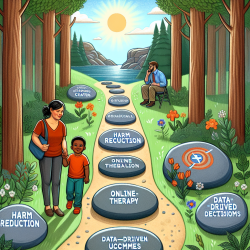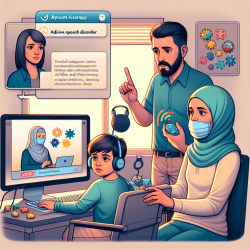Introduction
The COVID-19 pandemic has been a test of resilience across various sectors, including agritourism. The study "Agritourism resilience during the COVID-19 crisis" provides valuable insights into how agritourism operations in North Carolina adapted and thrived amidst the pandemic. These lessons are not only applicable to the tourism industry but can also inspire other fields, such as speech-language pathology, particularly in online therapy services like those offered by TinyEYE.
Understanding Resilience in Agritourism
The research highlights two key strategies that agritourism operations used to maintain resilience: diversification and reorganization. Diversification involved expanding income streams beyond traditional offerings, such as introducing virtual experiences. Reorganization referred to modifying existing operations to adapt to new realities, like implementing online ticketing systems to manage visitor numbers.
Applying Agritourism Strategies to Speech-Language Pathology
Speech-language pathologists can draw parallels from these strategies to enhance their practice, especially in the context of online therapy. Here’s how:
- Diversification of Services: Just as agritourism operations diversified their offerings, speech-language pathologists can expand their service portfolio. This could include offering virtual workshops, webinars, or creating digital resources for parents and educators to support children's speech and language development.
- Reorganization of Practice: Implementing new systems, such as digital scheduling and teletherapy platforms, can streamline operations. This mirrors the agritourism industry's shift to online ticketing, which improved customer satisfaction and operational efficiency.
Chaos Theory and Innovation
The study applies chaos theory to explain how agritourism businesses thrived during the pandemic. The "butterfly effect" and "edge-of-chaos" concepts illustrate how small changes can lead to significant transformations. Speech-language pathologists can embrace this mindset by being open to innovative approaches and technologies that may initially seem minor but could lead to substantial improvements in therapy outcomes.
Encouraging Further Research and Application
For practitioners in speech-language pathology, the lessons from agritourism resilience encourage further research into adaptive strategies and innovative practices. By exploring how other industries have successfully navigated crises, speech-language pathologists can develop robust, adaptable practices that meet the evolving needs of their clients.
Conclusion
The resilience demonstrated by agritourism operations during the COVID-19 crisis offers valuable lessons for speech-language pathologists and other practitioners. By adopting strategies of diversification and reorganization, and embracing the principles of chaos theory, professionals can enhance their practice and improve outcomes for their clients. For those interested in delving deeper into the research, the original study provides a comprehensive analysis of these strategies and their impact.
To read the original research paper, please follow this link: Agritourism resilience during the COVID-19 crisis.










